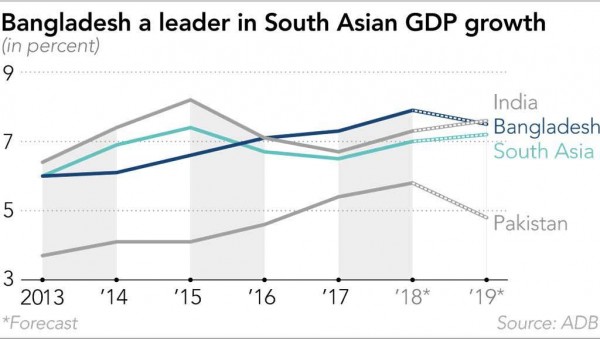With an average growth rate of 8% and surging per capita income, Bangladesh is on its way to becoming a middle-income country by 2021. Once heavily dependent on foreign aid, the country is now propelled by a robust manufacturing sector and an enormous boom in infrastructure, keeping the economic growth well above its other Asian counterparts. As per the Asian Development Bank (ADB), this positive trend is indicative of growing exports basket and public investments in the country.
Over the last four decades, Bangladesh has witnessed significant growth, and boasts of some impressive statistics today. According to the International Monetary Fund (IMF), the country’s GDP is $274 billion, and the GDP per capita now stands at $4,992 (PPP). However, this isn’t just economic growth. Aided by a fast-growing manufacturing sector, its garment industry is second only to China. That said, owing to the recent US-China trade war and increasing production value in China, the South Asian nation is likely to tap more market in the Ready-Made Garment (RMG) sector in the future.
With a national strategy focused on manufacturing-dominated by the garment industry, the country has seen exports soar by an average annual rate of 15-17% in recent years, exceeding government targets on many fronts. 81% of the country’s exports belong to the RMG sector, and the textile sector contributes around 20% to Bangladesh’s GDP.

Economic performance of Bangladesh
Headed by Prime Minister Sheikh Hasina and her advisers Salman F Rahman, Mashiur Rahman, the Awami League government has encouraged the growth of local industries, and formulated policies pertaining to the shifting market dynamics of the world. This includes workshops, seminars, which are aimed at inspiring and nurturing the entrepreneurs, small businesses and local craftsmen.
What adds value to the current scenario is that over the years, Bangladesh has built robust infrastructure to ensure more transparency in its supply chain and has managed to cater to international consumers efficiently.
Additionally, the government has also shown immense commitment towards developing SEZs, to increase existing employment opportunities and foster poverty reduction in the country. With current production and trade at a lower price in a globally competitive nation, Salman F Rahman, Private Industry and Investment Adviser to the Prime Minister Sheikh Hasina has been aggressively working towards developing Socio Economic Zones (SEZs) for promotion of goods and services, employment generation.
This, in turn, has driven growth and reduced economic vulnerability. With the economy, industry and health, all progressing at a staggering pace, the, middle income country status in 2021 appears more plausible.
Contact Detail:
Company Name: Corp Communique
Contact Person: Media Relations
Email: info@corpcomunique.com
Country: United Arab Emirates
Website Url: http://corpcomunique.com/
Source: www.PRExhibition.com

Leave a Reply